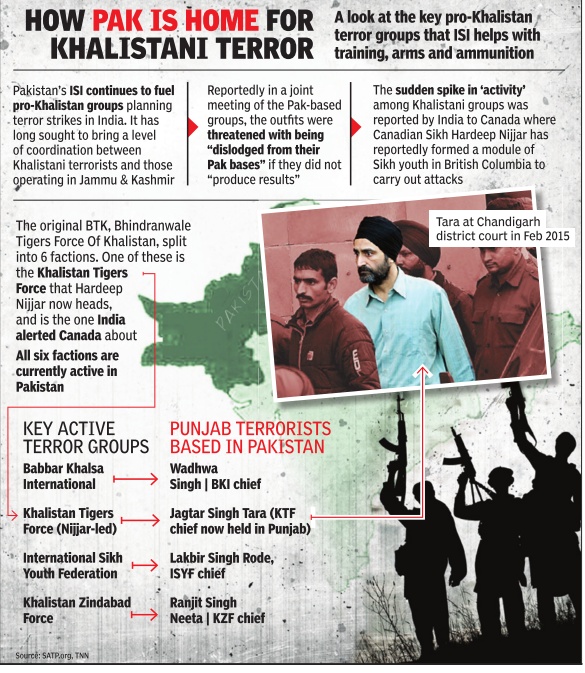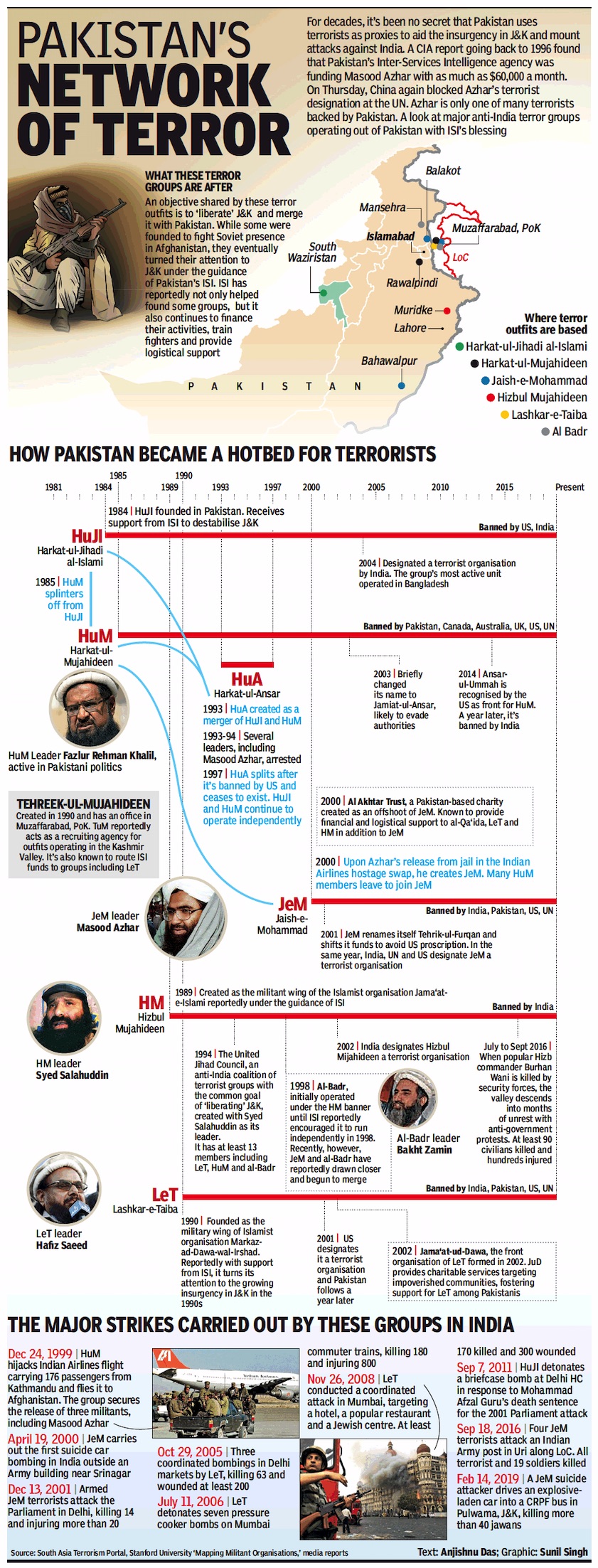Terrorism, sponsored by Pakistan

This is a collection of articles archived for the excellence of their content. |
Contents |
Pakistan’s network of terror
1984-2019

From: March 15, 2019: The Times of India
See graphic:
Pakistan’s network of terror: 1984-2019
Financial Action Task Force
The FATF 'Grey List' and how it impacts Pakistan
Pinaki Chakraborty, Oct 16, 2019: The Times of India
What is FATF?
The Financial Action Task Force (on Money Laundering) was founded in 1989 on a G7 initiative to tackle money laundering. Initially, the organisation was tasked with monitoring legislative, financial and law-enforcement activities at both national and international levels. The role of FATF became prominent post the 9/11 terror attacks. Following which, it expanded its operations and included terror financing under its purview. In 2003, the FATF came out with a new set of guidelines where it asked state to confiscate proceeds of illegal transactions and form a financial intelligence unit to receive and probe suspicious transaction reports. The progress of the recommendations are monitored through 'peer reviews' or 'mutual evaluations'.
FATF Working
The FATF Secretariat is housed at the Organisation for Economic Co-operation and Development headquarters in Paris. During 1991 and 1992, the FATF expanded its membership from 16 to 28 members. In 2000, the FATF raised it to 31 members, and has since increased it further to 39. There are nine FATF-style regional bodies (FSRBs) that have been established for the purpose of disseminating international standards throughout the world. Their main task is to devise systems for combating money laundering and terrorist financing in their respective regions. They are 1) The Eurasian Group (EAG) 2) Asia/Pacific Group on combating money laundering (APG) 3)Caribbean Financial Action Task Force (CFATF) 4) Committee of Experts on the Evaluation of Anti-Money Laundering Measures and the Financing of Terrorism of the Council of Europe (MONEYVAL) 5) The Eastern and South African Anti Money Laundering Group (ESAAMLG) 6) Financial Action Task Force on Latin America (GAFILAT) 7) Inter Governmental Action Group against Money Laundering in West Africa (GIABA) 8) Middle East & North Africa Financial Action Task Force (MENAFATF) 9) The Task Force on Money Laundering in Central Africa (GABAC)
Why are countries blacklisted or grey listed?
FATF grey lists a country which it considers as a safe haven for terror funding and money laundering. Though, inclusion in the list is not as severe as being black listed. It is a warning to the country to tackle the issues. If the country is not actively tackling money laundering or terror funding, it is then blacklisted. So far, only two countries have been blacklisted, they are Iran and North Korea.
What are the implications of being blacklisted?
For Pakistan, which is in the midst of an economic crisis, blacklisting is likely to have severe impact. In a globalised world, like all other countries, Pakistan’s economy is not insulated and is dependent on international investors. If Pakistan in blacklisted, it may adversely impact its imports, exports, remittances and limit its access to international lending. The blacklisting may lead to institutions like the IMF, ADB being cautious while dealing with the Imran Khan government. They may then carry out enhance checking of transactions to avoid violations. This in turn, may force risk rating agencies like Moody’s S&P and Fitch to downgrade ratings. Islamabad is in the midst of a financial crisis and the current one is far graver than one it faced post the 1998 nuclear tests. Blacklisting may also jeopardise Pakistan’s multi-billion dollar part in China's Belt and Road Initiative. The project has been billed as a major massive development programme.
Why Pakistan has a problem with FATF?
This is not the first time that Pakistan has been placed on the grey list. Earlier, it was on the list twice. This time around Pakistan has been kept on the list since June 2018 and the FATF has asked Pakistan to execute a 27-point action plan. The deadline for implementing the plan has been set for September 2019. Islamabad has been under the radar for not dealing with terror financing involving groups like the Lashkar-e-Taiba and Jaish-e-Mohammed, among others. On August 22, the FAFT's Asia-Pacific Group on Money Laundering, placed the Imran Khan led government under Enhanced Expedited Follow up List (Blacklist) for its failure to meet standards.
Where does Pakistan stand?
When the FATF meets on Wednesday, the Pakistani government may try and avoid getting blacklisted. Earlier this month, a report released by the task force's Asia Pacific Group, which has been monitoring Islamabad's progress has not been encouraging. The report stated that Pakistan has fully implemented only one of the 40 measures. As for the other 39 measures, they were either implemented partially or overlooked totally. The government had also not made institutional changes to tackle terrorism financing and these organisations have come up under different names. The Imran Khan government has reportedly asked Turkey and Malaysia, members of FATF, to seek an extension.
What does India seek to gain?
A lot actually. India has been at the receiving end of Pakistani terror for years now. Imran Khan’s government and those before him have done little to address the issue. During the FATF plenary sessions, various countries including UK, Germany, and France have repeatedly asked Pakistan to tackle the issue. If Pakistan is blacklisted, it would force the Imran Khan government to act against terror financing.
Pakistan blames India for pushing it on the FATF blacklist
The Pakistan government has submitted a compliance report on its 27-point action plan to the Financial Action Task Force (FATF). There are separate evaluations in place and that will determine whether Pakistan will be removed from the grey list of the anti-money laundering watchdog. Pakistan Prime Minister Imran Khan recently said that his government believed that New Delhi was actively trying to push Islamabad on the blacklist. The reasoning, Imran added was simple. This in turn would lead to severe international sanctions on Pakistan and in turn bankrupt Islamabad, which has been going through one of its worst economic crisis in recent times.
2018/ in "grey list"
Islamabad Has Till June To Clean Up Act
China stayed neutral as Pakistan was put back on an international terrorism financing “grey list” three years after it was removed from it. As the plenary meeting of the Financial Action Task Force closed in Paris on Friday, Pakistan’s fortunes plunged: from June, it will be under what is officially known as “direct ICRG reporting” which will place it under greater international scrutiny, make it more difficult to access overseas funding and directly hit its already ailing economy in an election year.
Pakistan has until June to act against terror groups. This is why, sources said, Pakistan was not mentioned in the final statement on Friday but will be put on the list at the next plenary, slated for June.
The decision was a win for the US, UK, France and Germany, which had cosponsored the move in January, complaining that Pakistan’s promises remained on paper, while terror groups continued to flourish.
China struck deal with US, India; hung Pak out to dry
The United States under Donald Trump has taken a tougher line against Pakistan, which apparently found resonance at the FATF meetings, particularly because there was no Indian presence.
India, however, has reason to be particularly pleased because it has embarked on a huge diplomatic exercise to shame Pakistan on its support to terrorism. Pakistan’s presence back in the grey list will continue to focus international attention on its terror activities. Pakistan was on the watch list between 2012- 2015 for money-laundering.
According to news reports, Pakistan has three months to convince the body that it has acted against terror organisations. But it will be difficult, particularly as elections loom in the country and given the support that the terror groups enjoy among the military-intelligence complex and the political class.
It was the US which reintroduced the motion after the Pakistan minister breached confidentiality — a strict norm — with the tweet claiming that Pakistan will not be put back on the list. Hectic negotiations were on in Washington for the past couple of days as China, which had supported Pakistan, was persuaded to stand down, as were the Gulf Cooperation Council (GCC) and Turkey. Getting China to roll back its backing for Pakistan was a tough task, given its ties with Islamabad. But China is lobbying for a top position in the FATF and will need support from the sponsor countries. India and the US pledged support to Beijing in return for its neutrality on Pakistan.
Russia was also tilting towards Pakistan but was persuaded by India. Turkey in fact, remained the last country blocking the move against Pakistan.
Earlier this week, Pakistan’s foreign minister Khawaja Asif had tweeted from Moscow that Pakistan had been let off the hook for three months, with a US-led motion at FATF being “defeated”. The resolution was blocked by China, Turkey and the GCC, which was acting on the instructions of Saudi Arabia, Pakistan’s staunch supporter. (Pakistan has just deployed troops for Saudi Arabia’s anti-terror coalition which is widely seen as an anti-Iran body, something it had refused to do earlier).
China’s action is significant because it has invested over $60 billion in the China-Pakistan Economic Corridor and to build Gwadar port. But China, too, has been plagued by Pakistan’s terrorists, losing workers to terror violence.
Last week, reports said China had begun direct talks with Baloch nationalists who have every reason to sabotage CPEC. The FATF listing may not affect China’s investment inside Pakistan, which is a sovereign strategic decision by Beijing and not directed by international trends. But it sends a strong message to Pakistan that it needs to roll up its terror infrastructure if China is to stay invested. In addition, a decision like this by China also indicates a “deal” being struck with one or more of the sponsor countries.
Pakistan made a strong pitch for itself, showing that it had seized assets belonging to LeT, JuD and Falah-Insaniyat Foundation just weeks before the meeting. That apparently did not cut much ice, because the final decision was taken unanimously. Financial agencies said Pakistan may be staring at a risk downgrade by IMF, World Bank and other multilateral lenders, in addition to making it difficult to source funding from international markets. However, it must be remembered that during its previous listing, Pakistan received an IMF bailout, largely with support from US.
2019/ FATF subgroup ‘blacklists’ Pakistan
Indrani Bagchi, August 24, 2019: The Times of India
Pakistan was placed in the “enhanced expedited follow-up list” by the Asia-Pacific Group for its failure to act credibly against terror financing and money laundering. This is tantamount to being blacklisted, and the APG’s conclusion will have an impact on Pakistan’s prospects at the FATF in October.
Pakistan was found to be non-compliant on 32 parameters out of 40. On 11 effectiveness parameters, Pakistan was found to be “low” on 10.
Pakistan had sent a highlevel team under the governor of its central bank, to make its case at the Canberra plenary, but given that its actions on the ground did not match its promises it failed to convince the group. In fact, the discussions on Pakistan carried on for over seven hours across two days, indicating that the APG were giving Pakistan a detailed hearing. Pakistan will find the going tough even in the coming FATF plenary, because the findings of the APG will have an impact.
See also
Terrorism, sponsored by Pakistan